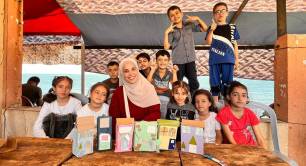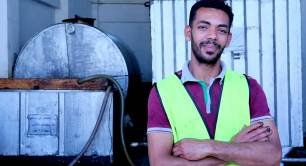New Arab Impact Network aims to push MENA impact investment beyond 2% of global market
The newly launched Arab Impact Network aims to build an inclusive movement of impact organisations and ‘change the region’s narrative from one of scarcity to opportunity’.
An impact investing network representing the Middle East and North Africa (MENA), called the Arab Impact Network, has been launched with the aim of growing the region’s impact ecosystem.
The network was publicly launched at an event hosted by impact investing network Impact Europe and Moroccan impact lab Happy Smala in Casablanca, Morocco at the end of April. Alongside Happy Smala, the other founding organisations of the Arab Impact Network are longstanding Arab venture philanthropy organisation Alfanar and impact investment support body Impact Jordan.
Despite being made to feel “beautifully welcome” by other regional impact investing networks, including Impact Europe, AVPN and AVPA, the founders of the Arab Impact Network believe the region requires more focussed representation, a better connected network and culture-specific strategies and practice.
The launch of the network is primarily an invitation to other organisations to join the movement. The network currently has no funding in place and the founders want to build a community first, before initiating a collaborative process to identify appropriate structures, strategies and activities.
The world might be on fire and yes, there are very urgent things for us to attend to, but we need to do this in the way that is appropriate to achieve the ultimate objective
But the founders have set some initial aims for the network, including exchange of good practices, facilitating commercial exchanges, setting impact measurement and management standards for the region and advocating for “impactful” policy making.
Andrew Gharaibeh Collingwood (pictured), co-founder of Impact Jordan, told Pioneers Post the network was adopting an inclusive, community-first approach to ensure the founders “practise what they preach” and it would be truly representative of the organisations which join.

Gharaibeh Collingwood said: “Intellectually and practically, being truly inclusive means you’ve got to go slower. The world might be on fire and yes, there are very urgent things for us to attend to, but we need to do this in the way that is appropriate to achieve the ultimate objective. So if we are to be representative as an Arab Impact Network and start to change that narrative from scarcity to opportunity, it needs to be a movement, and movement building is very different from project delivery.”
The need for greater impact investment in MENA is clear. The region has some of the most urgent humanitarian crises in the world, not least in Gaza and Sudan, a problem exacerbated by large international aid organisations like USAID withdrawing funding. But, the Global Impact Investing Network’s 2024 market sizing research found impact investment into the MENA region made up just 2% of the global market.
A localised approach to impact
Gharaibeh Collingwood explained Impact Jordan had been exploring ideas of ‘contextualisation’ and ‘localisation’ in relation to impact practice. He defined ‘contextualisation’ as taking frameworks born out of European and North American practice and making them fit into global south ecosystems, whereas ‘localisation’ is developing impact practice from a starting point of Indigenous practices.
He said this concept was central to both why it was necessary to launch the Arab Impact Network and the organisation’s approach and that he wants the Arab Impact Network to enable the region’s impact ecosystem to move away from being defined by the 2% figure from GIIN’s research and develop a localised narrative of opportunity, rather than scarcity.
Because many impact organisations in MENA were already connected to one or more of the other regional impact networks, Collingwood said the Arab Impact Network would be careful to not remove existing opportunities, but prioritise filling in “the bits that are missing”.
For example, at the network’s launch, Eric Asmar, CEO of Happy Smala, said: “Building networks and connections in the Arab world now is a bit like taking flights. To go from one Arab country to the next, we often must fly over Europe first. This needed to change.”
Also speaking at the network’s launch Maya Rahal, Lebanon country director at Alfanar, said: “The current system is not actively helping us. What Alfanar has realised so far, has largely been achieved in spite of this system, and not thanks to it. So the idea was born for a network that is Arab-led, and embeds the culture and knowledge that is present in the Arab world. A network that uses the existing social and intellectual capital to our advantage, because what we lack is not talent, but connection.”
- The Arab Impact Network has issued an open call to impact stakeholders active in the region. Those interested can fill out this form to express interest.
Image: An Impact Jordan workshop on defining localised impact (courtesy of Impact Jordan)
| Ready to invest in independent, solutions-based journalism?
Our paying members get unrestricted access to all our content, while helping to sustain our journalism. Plus, we’re an independently owned social enterprise, so joining our mission means you’re investing in the social economy. |




